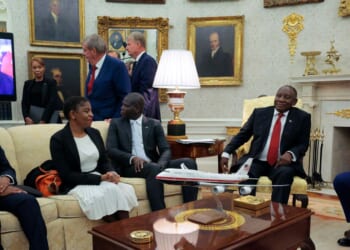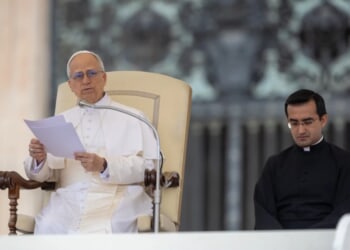Turkey’s F-35 return hinges on ditching the Russian S-400, which it refuses. Despite tensions, Ankara’s growing defense industry and geopolitical influence suggest reentry could benefit Washington more than Turkey.
During President Donald Trump’s first administration, NATO ally Turkey was expelled from the Lockheed Martin F-35 Lightning II program after Ankara moved forward with the acquisition of the Russian-made S-400 Triumf air defense system. NATO officials and Washington have continued to take the stance that the two systems are incompatible, which could put the security of the fifth-generation stealth fighter at risk.
Various options have been floated that could allow Turkey to rejoin the program, including its adoption of the F-35 and possibly even its return as a partner in the aircraft’s production. However, Erbil “Bill” Gunasti, former Turkish ministry press officer and spokesman for eight prime ministers, admitted the issue is complicated.
To Get More F-35s, Turkey Must Ditch The S-400
The most obvious and perhaps easiest resolution would be for Ankara to give up the S-400, even though it had paid millions. Scenarios have been floated in the past that could see the system sold to a third party, transferred to a US military base, or even returned to Russia.
None of these are real options for Turkey, Gunasti told The National Interest.
“The S-400 is a non-issue for Turkey, meaning there is nothing to discuss regarding the S-400 as far as the Turks are concerned. It is non-negotiable, Gunasti explained.
He acknowledges that deploying the S-400 in another sovereign territory, such as Northern Cyprus or Syria, is a national and internal decision that Turkey can make without prior notification or consultation. However, the issue is a bit more complicated, as technology from the S-400 could be used in other air defense platforms.
“The Turkish-built Siper system, reportedly superior to the S-400 in range and effectiveness [developed] since the December 2020 CAATSA sanctions, may render the S-400 less significant,” Gunasti noted, while he highlighted the recent success Pakistan saw in shooting down multiple Indian Air Force aircraft in this month’s border flare up.
“Speculation, particularly from the BBC, suggests that Turkish electronic warfare systems, such as a version of Koral or Soj, rendered sophisticated Russian and French aircraft vulnerable,” said Gunasti. Based on this information, it is plausible that Turkey already understands the S-400’s capabilities, enabling Pakistan’s success.”
The Turkish Siper system likely incorporates S-400 capabilities.
“Logically, the S-400’s relevance, whether deployed in Turkey or a neighboring territory, is negligible. To answer the question plainly: No, Turkey will not entertain discussions about the S-400,” Gunasti continued.
Turkey’s Relations with Ukraine and Russia Unlikely to Affect F-35 Resupply
Turkey has been one of the few NATO nations maintaining ties with both Kyiv and Moscow, but that may have a minimal impact on its goal of obtaining the F-35.
Turkey’s relationships with Russia, Ukraine, or both are unaffected by the Russia-Ukraine war or any potential peace deal. Turkey’s ties with these neighbors will remain unchanged regardless of global or regional developments. Russia-Turkey trade is approaching $50 billion annually, to reach $100 billion soon,” said Gunasti.
Moscow and Ankara are now finalizing a second nuclear plant deal, following the imminent operation of the Akkuyu plant.
The next project is valued at $22 billion.
“Russia aims to make Turkey an energy hub, not only through transshipping (ongoing for years) but also by storing energy in Turkey,” the former press officer explained.
“Ukraine, meanwhile, relies heavily on Turkey, with engine and drone factories producing Turkish-branded products or components for Turkish military platforms exported to third countries. Russia and Ukraine depend on Turkey for grain and energy exports, as their shipments must pass through the Turkish Straits.”
Gunasti suggested that a peace deal, or lack thereof, between Russia and Ukraine, will not affect their relationships with Turkey.
“These three nations are interdependent and share a long history, including the Ottoman Empire’s historical control over Ukraine and southern Russia. Notably, both the Russian and Ukrainian defense ministers have Turkish ancestry. This context underscores the irrelevance of the question,” said Gunasti.
Just last week, the Kurdistan Workers’ Party (PKK) announced it would disarm and disband. It remains unclear what the Kurdish people will receive if the PPK is permanently disbanded and disarmed, but this may impact Ankara’s relationship with other NATO members.
Other Kurdish groups that Ankara has identified as terrorists may also be less of a threat.
“Kurdish terrorist groups and their affiliates, such as ISIS and Daesh, created by certain ’Western’ agencies since the 1980s as part of a proxy war strategy in northern Iraq and Syria, will soon be eradicated, likely before the year ends,” suggested Gunasti.
“The ’Kurdish issue’ has been a tool for Western powers to exert influence, but those days are over. The tables have turned: Western powers now need Turkey, while Turkey does not require the West. This dynamic explains Turkey’s standing in NATO,” Gunasti added.
“Western Europe relies on Turkey to keep NATO viable, especially after President Trump emphasized that Europe must bear the cost of its defense.”
Does the US Need Turkey to Adopt the F-35?
Gunasti said that despite not having a clear path for Ankara back into the F-35 program, it could benefit Washington far more than Ankara.
“The CAATSA sanctions, which removed Turkey from the program, cost the United States a $1 trillion economy,” he stressed.
“The United States was expected to produce over 3,000 F-35s by now, but only about 300 are operational in its inventory. Turkey’s potential benefits from rejoining include limited technology transfer and joint marketing with America.”
He added that Turkey’s rejoining could revitalize the F-35 program, which has struggled since Ankara’s exit.
“Meanwhile, Turkey’s KAAN aircraft is set to enter the market by 2028, if not sooner,” Gunasti told The National Interest.
“Rejoining the F-35 program could align it with KAAN’s development, enabling joint marketing of both aircraft. Since the December 2020 CAATSA sanctions, Turkey has advanced its indigenous capabilities. In short: Turkey’s reentry would benefit the United States tremendously, while Turkey’s gains would be minimal.”
About the Author: Peter Suciu
Peter Suciu has contributed over 3,200 published pieces to more than four dozen magazines and websites over a thirty-year career in journalism. He regularly writes about military hardware, firearms history, cybersecurity, politics, and international affairs. Peter is also a Contributing Writer for Forbes and Clearance Jobs. He is based in Michigan. You can follow him on Twitter: @PeterSuciu. You can email the author: [email protected].
Image Credit: Shutterstock/vaalaa.














